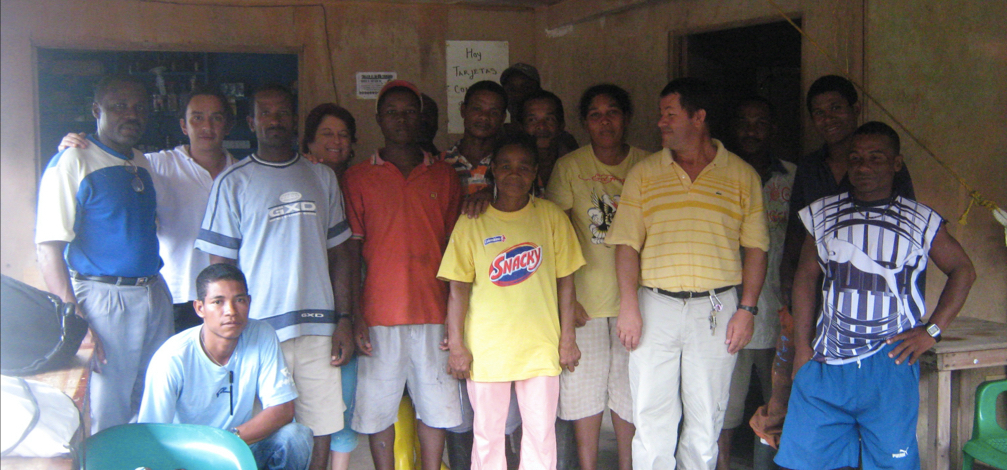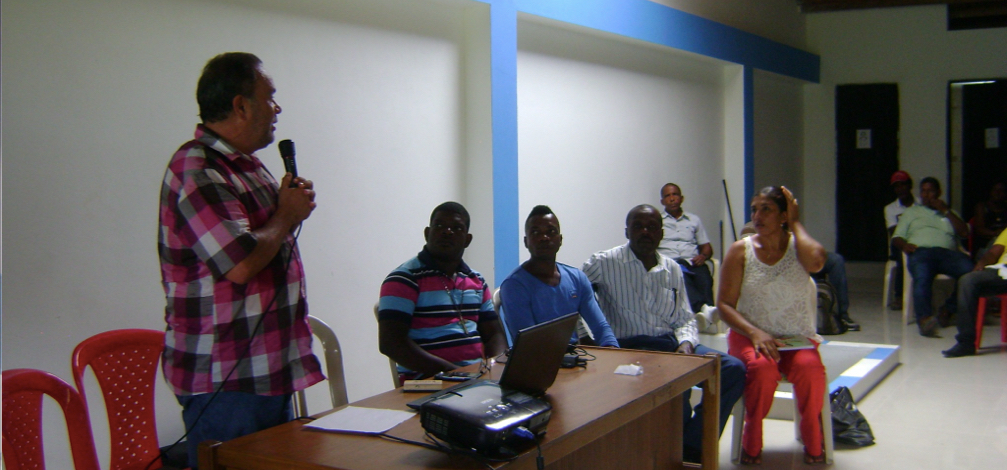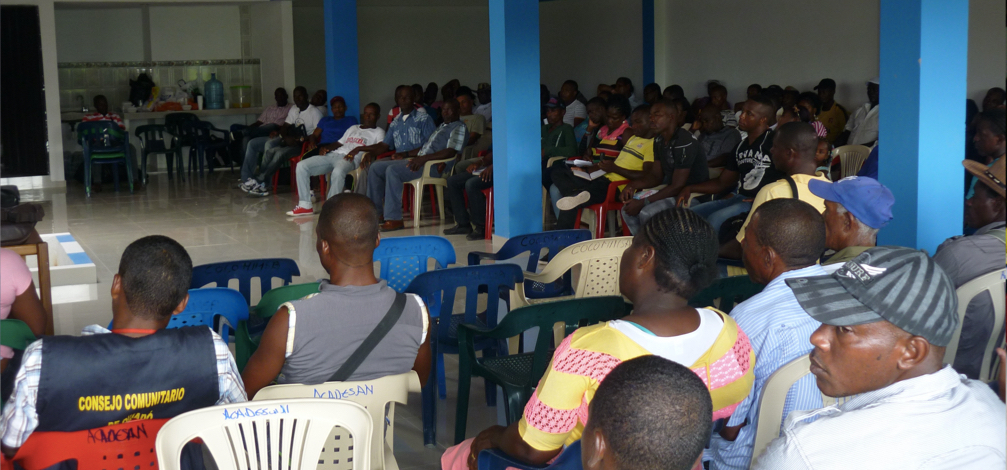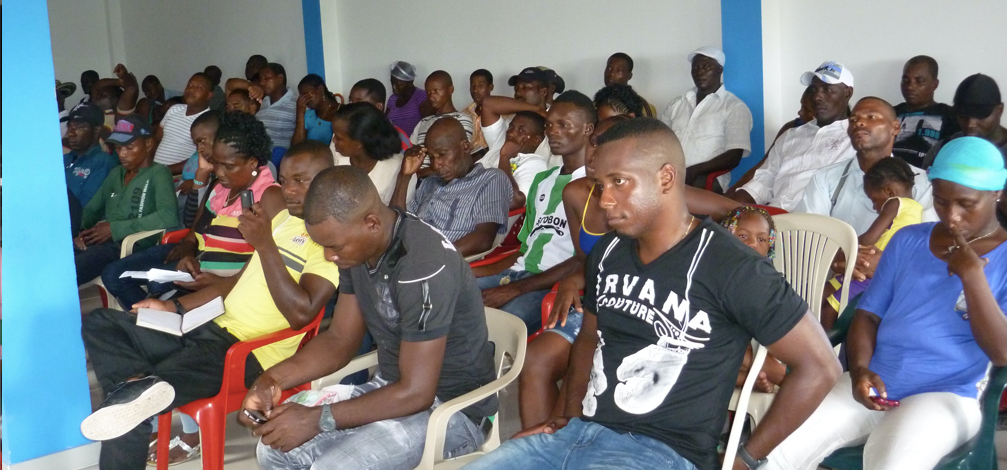Nine years ago, the black communities of the San Juan Community Council learned that a portion of the territory they inherited from their ancestors, which after decades of struggle they were able to obtain the collective title to, is under threat of dispossession by a foreign company.
Since 2009, the Major Council of the General Community Council of San Juan (ACADESAN) which groups 72 black communities, has been carrying out food security projects financed by non-governmental organizations and was also in talks with the National Hydrocarbons Agency (ANH) and private companies seeking to carry out soil studies in search of minerals.
While the Major Council was consulting and socializing with the community to decide whether to allow these studies to be carried out, they learned that two people from outside the region were the supposed owners of the 32,450 hectares of their ancestral territory, equivalent to 4 percent of the collective title and 25 percent of the territorial extension of the municipality of Sipí.
They found out about this alleged ownership at the end of 2012, when a forestry engineer from Antioquia, Luis Enrique Betancur Hernández, presented himself before ACADESAN at its headquarters in Buenaventura. On that occasion he said he was representing a company called Desarrollo e Inversiones Progreso Verde, which, at that time, according to this portal, had not been registered with any Chamber of Commerce in the country.
Betancur explained at that meeting that he had extensive experience in the carbon bond market. His purpose was to develop this type of project in various regions of the country, including the department of Chocó and, of course, the municipality of Sipí.
Carbon credits are one of the international mechanisms proposed to reduce global carbon dioxide production. As a commitment assumed by the countries that are part of the Paris Agreement, it seeks to materialize "mitigative actions" for the nations that exceed the corresponding limit of greenhouse gas emissions. Communities and companies that contribute to this initiative receive economic resources. That is the business.
The engineer from Antioquia arrived at ACADESAN’s headquarters with two other people: Evelio Arias Marín, one of the supposed owners of the property, and Andrés Caicedo, a commission agent who, according to what he told this portal, has been "involved in the mining and gold business for many years" and because of his knowledge of systems, had carried out projects that sought to encourage communities in Chocó to opt for "clean mining", but he didn’t specify which ones he was referring to.
To understand that first visit to ACADESAN, VerdadAbierta.com contacted Betancur in East Timor, Southeast Asia, where he was apparently providing consulting services on environmental issues to the government of that country. When asked about the carbon credits project he proposed to the black communities of Sipí, he replied that he had heard about it through Caicedo, who told him about "a very large piece of land in Chocó" where they could develop this business model.
But something wasn't right. “ACADESAN's lawyer, Jairo Velázquez, told us: 'No, what you have there is all false,' —recalls Betancur—. Evelio Arias was very upset because he’s the seller and, well, what was I going to do? I kept quiet and said: 'No, if that’s false, turn it off and let's go'".
But neither Betancur nor Caicedo left that meeting. On the contrary, they put on the table what the black communities of Chocó have been waiting for years: the possibility of developing productive projects on their lands. And they reinforced their proposal for carbon credits.
Significant progress was made from that first conversation. In early 2013, Betancur and ACADESAN executives signed a memorandum of understanding, which aimed to advance the joint creation of "special cores for carbon markets".
What was to come next set the community council authorities on alert and what seemed like an opportunity for the inhabitants became a strategy to cut off 32,450 hectares of their ancestral territory.
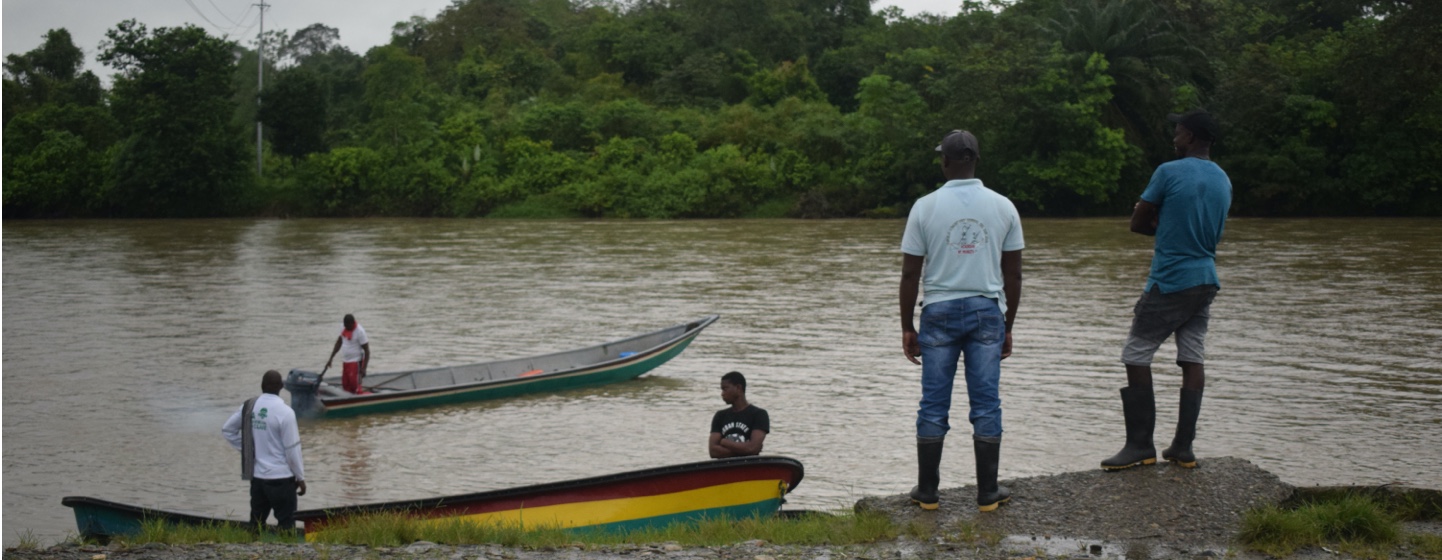
"We are the owners"
Parallel to Betancur's conversations with the communities in Buenaventura, a team of lawyers in Bogota, hired by this engineer, was analyzing the legality of the title to the 32,450 hectares that, at that time, were in the hands of Evelio Arias Marin and Jorge Andres Cordoba Carvajal.
Despite the signs of irregularity evidenced by the tradition of that property, Betancur and his lawyers did not object to anything and after a process of document verification decided to buy those lands. But before finalizing the deal, they incorporated the company Desarrollo e Inversiones Progreso Verde, through a private document dated April 26th, 2013.
This company was registered in the Chamber of Commerce of Bogotá three days later by the attorney Mónica Alejandra Villamil Carrillo, who appeared as the sole shareholder and manager. A subscribed and paid-in capital of 1 million pesos was registered.
That situation changed on June 15th of that same year, when the Panamanian firm Progreso Verde Holding Corp, legally represented at that time by Alexis Williams Arosemena, took possession of the company. Three days later, an extraordinary shareholders' meeting was called, and two decisions were made: the capital of Desarrollo e Inversiones Progreso Verde was to be to increased to one billion pesos and Betancur was appointed as the new manager and legal representative. It appears that these monies came from a Canadian investor.
With that backing, the Antioquian engineer closed the purchase of the 32,450 hectares, formalized through public deed 1142 of Notary 28 of Bogota, dated June 26th, 2013. With that document in hand, Betancur presented himself again before the ACADESAN Board of Directors and informed them that Desarrollo e Inversiones Progreso Verde was the owner of the land in the municipality of Sipí.
From that moment on, several meetings were held between Betancur, ACADESAN's directors and the communities in the villages of the municipality of Sipí and other municipalities in the San Juan region to discuss the carbon bond proposal and other projects. At least 70 visits were made to the communities settled along the rivers of the San Juan region and three zonal assemblies were held in the villages of Charco Largo (Sipí); Dipurdú del Guásimo (Middle Zone of San Juan); and Palestina (Litoral del San Juan).
“We reached a point where we made a pact with ACADESAN —Betancur explains—, to move forward with a reciprocal cooperation agreement in which the ACADESAN board was paid funds for scholarships for children to study in Bogotá, and the board was paid about two years of professional fees”. To back up his claims, the engineer provided this journalistic team with the supports of these payments.
An inhabitant of the region close to this process, who preferred to keep his name confidential, recalls that Betancur was very generous with the company's resources and, at the same time, calculating with the needs of the communities: "The leaders and the time they dedicate to the organizational process is not remunerated. This has always been a latent complaint in all the leaderships: the co-workers the days they are in the leaderships, stop working in their activities to support their families. So Betancur, very broadly, offered these resources: 'let's pay the co-workers'".
In an ACADESAN assembly held in October 2015 in the Cucurrupí village of the municipality of Litoral of San Juan, the management of these monies was brought to the attention of all the communities and it was made clear that in no way did they compromise the independence of the Major Council or oblige ACADESAN to develop a project that they had not previously agreed upon internally as a community.
Usurpation strategy?
Elizabeth Moreno Barco is the current legal representative of ACADESAN's Major Council. When Progreso Verde arrived in Sipí, she was part of ACADESAN's board of directors. She recalls that, at that time, they carefully reviewed the situation of the land with a legal team and concluded that it was a strategy to usurp the land and take advantage of the communities.
"They said 'let's go to those little black people and we'll stuff them with anything and since they are afraid of one thing and the other, they'll get scared and say yes, yes, yes', but they didn't count on the fact that an organized community, which has had the advice of many people who worked in the black community processes, was ready to defend their territory", Moreno emphasizes.
Faced with this opposition, Betancur desisted for a time from reclaiming the land and changed his strategy. "He offered a partnership where they could work with micro-enterprises or companies that were related to the soil, with what the territory produces, but the curious thing was that they did not look for any other territory, but rather they looked exclusively at Santa Rosa", explains the leader.
The reason is apparently simple: this hamlet, located on the banks of the Garrapatas River, is the closest black community to the 32,450 hectares polygon that Betancur had purchased on behalf of the Progreso Verde company.
“In the meetings they only talked about business, about the company, about so much for the community, about creating a partnership” —says Yeison Mosquera, a leader from Santa Rosa—. The company promised to pay all the expenses and support the youth here so that in the future they would be the representatives of the company".
These discussions bore fruit on January 8th, 2014. On that day, before the 59th Notary Office of Bogota, a "Cooperation, Impact and Benefit Agreement", was authenticated, signed between the then legal representative of ACADESAN, Santiago Salazar, and engineer Betancur. This document pretended to contain"the terms and conditions of negotiation for the development of sustainable economic activities in the collective territory of ACADESAN".
During the consultation stages, Progreso Verde's legal representative offered a percentage of the productive projects that the communities did not accept. Initially, he proposed 40 percent for the communities and 60 percent for the company, but the communities demanded 50 percent for both parties.
"When their intentions were seen, the Assembly asked for 20-80: 20 for the company and 80 for the community. Then that man —Betancur— got angry. At the end he told them: 'you came in here claiming a part of the territory, well, before making any kind of negotiation, we need a document where you confirm that you are not the owners of the territory'", says Moreno.
To finalize the negotiations, a meeting was held on May 9th, 2015, at which it was agreed to sign, that same day, a Transaction Agreement between ACADESAN and Progreso Verde, "which established a coexistence pact to move forward, jointly", the aforementioned Cooperation, Impact and Benefit Agreement, signed a year earlier.
In this new document, authenticated in the Sole Notary of Istmina that same day, Betancur and Santiago Salazar, by then ACADESAN's legal representative, signed three points to promote the initiatives: relations would be based on the principles of good faith and transparency; they would work in harmony to generate an economy that would benefit the communities; and Progreso Verde would not claim the 32,450 hectares as its own because they were within ACADESAN's collective title.
But as this investigation has shown, Betancur lied in that agreement, because by the date it was signed, he had already purchased the 32,450 hectares property.
After signing and formalizing the Transaction Agreement, ACADESAN’s Board of Directors did not want to move forward with any project with Progreso Verde or its representative because "they did not give the necessary guarantees to continue with the negotiation", says Moreno.
The signing of this document and the adverse position of the community council, according to Betancur, caused him problems with the company's partners, about which he did not want to give precise details.
“In one of those prior consultations —says the engineer— they took me out and told me to go somewhere to sign a paper saying that the company Progreso Verde could not make any kind of claim to ACADESAN and vice versa. I signed that paper because I really felt in my pockets an AK-47 rifle pressuring me. I signed the paper, went to Bogota, told what had happened and then they kicked me out of the company".
Betancur also didn’t give details of who pressured him in this way.
The community council assures that they are not aware that the representative of Progreso Verde has been threatened by any illegal armed group and maintains that the signing of the document was not done under pressure. "He went of his own free will" reiterated members of the Major Council.
Days later, ACADESAN received a letter informing them that Betancur was no longer the legal representative of Progreso Verde. "He was fired, people sensed that because he had signed that document. Then everyone said that the interest was still in the land", recalls the board member at the time who prefers to keep his name confidential.
In Betancur's place, Marc Robert Williams was elected as the company's legal representative. This businessman, of Canadian origin, had attended meetings with ACADESAN’s directors and the community identified him as a key player in the operation of Progreso Verde.
VerdadAbierta.com looked for Williams to explain this situation, but after contracting the Covid-19 virus he said he suffered serious health problems that forced him to stop his work activities. Weeks later, an attempt was made to speak with him again, but he did not respond to the emails.
In Sipí they doubt Betancur's dismissal. They base their concerns on an event that occurred several weeks after the alleged change of legal representative in that foreign company. It turns out that the engineer from Antioquia invited Santiago Salazar, Jairo Velázquez —lawyer who works for ACADESAN— and Elizabeth Moreno, to meet with Williams in Medellín. The objective was to re-establish conversations about the production projects.
"They took us to a luxurious place in Medellin with all the protocols, well, of the ‘highlight’ and ‘full country’ people, a super and very exclusive apartment. They thought: 'well, now with this we are going to dazzle these peasants', but no. We, people who have been working for years towards the defence of the territory, were not going to submit to that".
Again, they rejected the offer and from that moment on the community council broke off relations with Progreso Verde. But the outsiders would continue to persist in their intentions to keep the land.
"Promising Heaven"
To that heart of the Chocoan jungle, and behind the back of Acadesan's Consejo Mayor, engineer Betancur returned in December 2016, "promising heaven", say some of its inhabitants.
"When I went there, it was completely covered with coca leaf’s and dominated by the FARC and some ELN groups", Betancur said. But he had little to say about his ability to move freely within a context of illegal armed groups and illicit economies.
Back in Sipí, he first visited the Sanandocito reservation, inhabited by the indigenous people of the Embera Katío. "I went there because the governor of the cabildo invited me”, says Betancur. The meeting was intended to implement productive projects, but he desisted from it because it wasn’t easy to get along with the native authorities.
This portal contacted a community member who was living in that indigenous reservation in 2016, but he refused to answer when asked about Betancur. A coordinator of the Orewa Association of Indigenous Councils explained to VerdadAbierta.com that the community member was suspicious and thought that this journalistic team was working for the engineer coming from Antioquia. And no matter how much the objective of this investigation was explained to him, he did not agree to talk about it.
After leaving the reserve, he arrived in Santa Rosa. "Here he arrived stating that the Indians had treated him badly there. He wanted to meet with the community, so a few of us met him there. He said that he needed to work with the communities and especially with the community of Santa Rosa", says Pablo Enrique Moreno, one of the local leaders.
This would be the first of multiple visits by the engineer from Antioquia, who, on several occasions, arrived in the company of his wife Madelén and his dog Samanta. But on whose behalf had he returned to Sipí and the community of Santa Rosa? According to versions gathered in Santa Rosa, this time he presented himself as "an investor" backed by "his partners", without giving more details.
This version is rejected by Betancur, who assures that he told "absolutely everything". But what he seems to have omitted is that, despite the fact that in 2015 he was relieved of the legal representation of Desarrollo e Inversiones Progreso Verde SAS, this time he returned to Sipí as an emissary of Proyecto Horizontes Verdes SAS, the company that had acquired the 32,450 hectares back in July 2016. The engineer from Antioquia had participation in both companies and they were controlled, from Panama, by Progreso Verde Holding Corp.
And he, Betancur, would continue returning to the communities all throughout 2017. In early January of that year, he returned to Santa Rosa to "work with the people", as the community recalls he said. He told them that he had previously worked with carbon credits in Riosucio, Chocó and rice crops in Villavicencio, Meta.
On that occasion, he proposed to work in the organic rice market with a 75 percent share for himself and 25 percent for the community, and he proposed to build a packing plant in a high area where, for those who harvest rice, it made no sense, since it required a great effort to carry the packages up there.
"We told him: 'But there is no need to set up a rice packing plant up there because nobody grows rice up here. So, we have to set it up somewhere central, either here in Santa Rosa, Marquesa, Chupey or wherever'", says Pablo Enrique Moreno, a local leader.
Betancur left not very happy about the community's position. He returned on different occasions proposing other deals, but none of them materialized. When the community of Santa Rosa mentioned to him that this type of arrangement should be made with the knowledge of the ACADESAN Board of Directors, he became upset.
Acting as Lord and Master
In a new visit to Santa Rosa, the engineer proposed building a house, this time in a mountainous spot near the Garrapatas River. "He is a man who is quite haughty. You say something, he doesn't like it and then he 'warms up' to you", says José Moreno, another of the local leaders.
Although they recommended internally not to participate in that idea, economic necessity made some members of the community work for Betancur, who, in June 2017, hired a couple of villagers to build the house at a specific point one hour from Santa Rosa by boat upriver and a 15-minute walk from the Garrapatas River to a jungle sector known as Las Peñitas.
The community recalls that Betancur carried a device, “like a GPS”, they said, that beeped. And, when they arrived at the point where the house stands today, the beeping became louder. “This is it”, said the engineer, according to Carlos Moreno, a member of the community who worked on the wooden construction.
For one day's work, Betancur paid 40,000 pesos, and in order to get the money, the workers had to
sign what they described as a collection account and give him a photocopy of their identity card.
"If we didn't agree to give the photocopy or sign,
they wouldn't give us the payment. He stated that this was necessary, that he had to meet
certain requirements. Since we needed the payment, we agreed", Moreno
acknowledges.
The engineer said that the community agreed to build the house, which he says will be used to
establish a “community center for training
conservation tour guides” and for the study of the region's fauna and flora.
"Yes, I lived there throughout a vacation period and
I also went there with all of them —members of the community— and we talked about many things:
we talked about astronomy, we talked about plants, we hiked through the forest, we collected
botanical specimens and I taught them about toxic plants and medicinal plants. We discovered
many things", says Betancur.
Like most of the land in this black community, the property where Betancur built the house was used
for agricultural activities. Carlos Asprilla, a member of the community, told VerdadAbierta.com that
his late father, Máximo, planted corn and plantains there, and raised pigs and chickens, as did his
grandparents before him.
Lawyer María Fernanda Angulo, who supports the ACADESAN communities, wonders if the construction of that house was a strategy so that, by consolidating an act of ownership in the property, it would be more difficult for a legal dispute to make him withdraw from the territory.
Once the house was built, the businessman's visits became more and more frequent. Ending 2017, Betancur returned to Santa Rosa in the company of a foreigner of an advanced age. “A gringo. He only spoke English”, they recall in the community, but they are unclear what he took him there for, other than to show him the territory. On another occasion, the same type of short visit was made in the company of an agroforestry engineer, but there’s no further details.
After so many meetings without agreeing on anything, in December 2018, Betancur appeared before the community of Santa Rosa with papers to formalize a rice business, financed by him, with profit percentages that the community did not consider equitable and under pressure in the decision-making time, as he said that the next day he had to leave because all the money was already in place.
“‘Mr. Betancur, well, you have the money, but with money and no land, you have nothing, so why don't we go 50-50?’”, a Santa Rosa leader asked him.
Betancur responded aggressively to this prevention: "If a drug trafficker came here with a gun and weapons, then we would comply with him, but since he didn't have anything, we wouldn't comply with him", the community recalls were his words at that last meeting. Faced with this refusal, the next day he left and never returned.
"Do you know why Betancur is not here? Because we caught him lying, he talked a lot. (...) If we start to remember everything he said, we would fill a book”, recalls José Armando Moreno. "Every time he came he had a different business. He would come with the idea of rice, then achiote, cocoa, houseboats, to set up a motor pump", community members recall. He even proposed to them to shoot a movie on the Sorobiatá River.
But Betancur did not completely leave the Chocó jungle. According to versions gathered in Santa Rosa, the engineer was paying an indigenous family from Sanandocito to live in the house. “If I am not mistaken, it is 900,000 pesos a month for them to live there”, they say in the community.
Although several members of the community agree on the issue of payment, when asked, Betancur denied the whole matter. VerdadAbierta.com was able to verify that, among pineapple, banana and sugar cane crops, the house was being inhabited.
"What worries us is that a guy who is paying money to take care of a house that is falling down must have an interest in that house", said a member of the community. According to the geo-referenced information of the 32,450 hectares, this portal found that the location of the house matches the sixth coordinate shown on a supposed map of the Colombian Institute of Agrarian Reform (Incora) attached to the deeds that give title to the foreign company.
Months after VerdadAbierta.com was in the municipality, sources in the territory informed this portal that the house was burned by unknown subjects.
Another intermediary arrives
Betancur's departure did not mean the loss of interest in those 32,450 hectares. The Acadesan Community Council received Boris Navarro Pabón, an environmental administrator from the city of Cali, with experience in green business and a track record of at least seven years in the hydrocarbons sector —between 2007 and 2015 he worked at the National Hydrocarbons Agency— at its headquarters in Istmina on June 10th, 2019.
At the time of that meeting, Navarro was the legal representative of Proyecto Horizontes Verdes SAS, appointed to that position on March 26th of that year, replacing engineer Luis Betancur. The purpose of his visit was to present ACADESAN authorities with a project to create a conservation sanctuary and to inform them that the company owned the 32,450 hectares.
Before speaking with the community council authorities, Navarro held several meetings in Quibdó with representatives of different institutions, including the Technological University of Chocó (UTCH); the Regional Autonomous Corporation for Sustainable Development of Chocó (Codechocó); and the Governor's Office of Chocó.
Presenting himself as a representative of a new company called Eightfold, the environmental manager told the institutions that the company was looking to carry out nine projects in different parts of the country —several of them in the Colombian Orinoco and Amazon regions—, one of which was in Sipí. He argued that they were interested in building a natural pharmaceutical company and seven other objectives set for the "conservation in perpetuity" of this piece of Chocó.
According to recordings of these meetings that reached this portal, Navarro told the academics and officials that his visit was prompted by the recent floods that had affected the families of Santa Rosa and that his objective was to articulate academia and local institutions in the Eightfold project, but what he did not tell them was that the company he represented had a title in the territory.
Regarding this, Navarro, who was contacted previously, but did not want to give out statements, clarified in a communication after the publication of this report that "I took to all the meetings the document that was delivered by the IGAC Office in Quibdó where they certified that the private title is registered. Additionally, the model of the Biodiversity Bank was planned for a private and not collective title. This information was widely shared with CODECHOCÓ, the Governor's Office and the UTCH. What’s more, the issue of private title is expressed in all the documents we prepared in Eightfold".
In the meeting with ACADESAN, when he did mention it, the news did not go down well with the community council spokespersons. "That's when I told him: 'If you consider that the land is yours, why do you come here to fight with us or why do you come here to get angry? —questioned Elizabeth Moreno, Acadesan's current and then legal representative—. If you know you have your legal papers, then bring us your legal papers, bring us your people, bring us those from INCODER (Colombian Institute of Rural Development) and we will decide who owns the land. We have to define if the land is yours or ours because the land cannot have two owners".
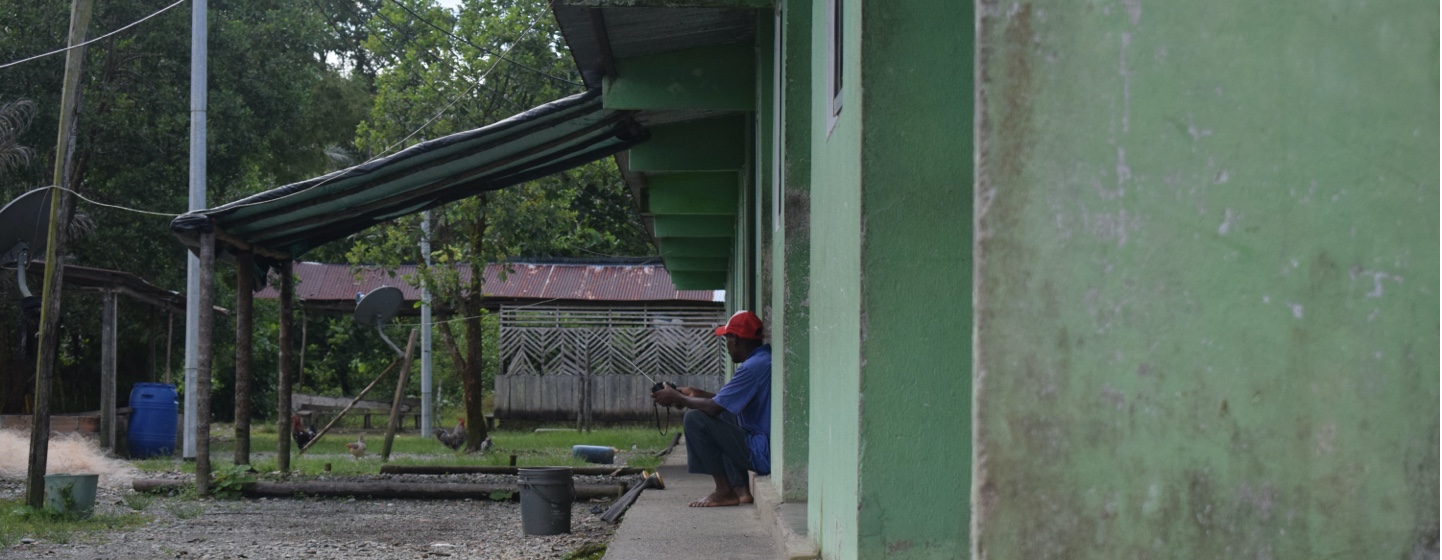
A little over a month after that meeting, the company Proyecto Horizontes Verdes SAS formally changed its name to Eightfold Biodiversity Bank SAS, according to records kept at the Bogotá Chamber of Commerce. The modification was registered on July 18th, 2019.
This new company aimed to develop in Sipí a “new bioeconomy model for Colombia, with a focus on illicit crop substitution from the private sector within a framework of Shared Value with local communities, academia and government, supporting the development of the Sustainable Development Goals, the Aichi Biodiversity Targets and the Paris Climate Agreement”.
After that first meeting, Navarro returned to the community of Santa Rosa, without informing the ACADESAN Council, with a speech similar to the one expressed by Betancur years before: He promised productive projects and suggested relocating the 38 families (109 people) that made up this community to a place known as San Lorenzo, 10 minutes up the Garrapatas River, so that they would no longer suffer from flooding; he also said he would build them aqueducts and sewage, and would provide them with solar energy, pave the new Santa Rosa and even build a seawall.
Taking advantage of this visit, Navarro sought out the mayor of Sipí, Luis Ángel Largacha, to get him to sign a document whereby the 32,450 hectares of the Cañón Río Garrapatas indigenous reservation that overlapped with the title held by the foreign company would be disengaged. In the community of Santa Rosa, they remember that the local leader did not sign anything until there was an agreement with ACADESAN.
Fifteen days after that visit, the environmental administrator returned to Santa Rosa with foodstuffs such as rice, tuna, oil and potatoes, among others, and accompanied by several people wearing clothes from SENA, the Technological University of Chocó, the Regional Autonomous Corporation for the Sustainable Development of Chocó (Codechocó), the National Land Agency, topographers and sociologists, among others. The idea was to advance the construction project of the new Santa Rosa and materialize the environmental conservation initiative.
VerdadAbierta.com contacted Navarro, but he was terse in his answers: "I resigned for just cause on July 10th, 2020. I have nothing to do with those people and I cannot be a spokesperson for those companies". Although it was explained to him that the interview sought to contrast what was said by the communities, he maintained his position and limited himself to sharing a document detailing the ambitious environmental conservation project that Eightfold had on the lands of Sipí.
Once the article was published, Navarro sent a communication to VerdadAbierta.com in which he clarified that "to say that the people 'wore clothes', and not to state clearly that they were officials (as can be clearly seen in the videos found on YouTube) of the UTCH and CODECHOCÓ, seems to me to be a tool to insinuate that I went to Santa Rosa with people who wore clothes of public institutions that were not, and this borders on the legal side of things. I thank you for clarifying this statement. As I said, we can see the videos and I can point out the officials and their positions. Additionally, there were no people from SENA or ANT".
After that meeting attended by officials from various state entities, no one returned to Santa Rosa on behalf of Eightfold Biodiversity Bank SAS. Apparently, they ran out of economic resources to continue seducing the communities.
In the various meetings that Navarro held with experts from Codechocó, the UTCH and others, upon hearing the businessman's words, they asked him three key questions: why Sipí, how did a model of private construction within a collectively titled territory work, and what was Eightfold's profit?
To the first question, he responded that in Sipí he saw an opportunity to generate “shared resources” with forgotten communities that the company he represented had been seeking to support. for years. To the second question he said that the way to solve it was to generate an alliance with the ACADESAN Community Council: “We provide the resources, they provide the land” and for this, Navarro himself had advanced and was planning to hold conversations with the national government and national environmental institutions such as the Alexander von Humboldt Institute for Research on Biological Resources.
Regarding the mention of the Alexander von Humboldt Biological Resources Research Institute, Navarro clarified in a communication after the publication of this report that "Eightfold held a meeting with the Humboldt, but we never signed any paper or advanced any type of alliance".
And the third thing took him further to unfold: “This company has an owner, his name is Daniel White, he’s from Canada. Mr. Daniel White has made a fortune throughout his life, what’s his fortune based on? In real estate in Canada, he is a builder in Canada, he manages land. He does that there. And one day he said, 'well, with all this fortune, all this wealth I have that I don't even spend, what is happening in the world? Is there hunger? Is there inequality?'. So, what did he propose: 'I'm going to make a fund', and he has a fund. In other words, we are funded. Eightfold is not an organization that seeks Mr. White's enrichment, that is already defined”.
Different sources who worked in the company confessed to VerdadAbierta.com that the Sipí project did have an economic interest and the Canadian businessman in charge of it is a questioned foreign investor: Daniel Alexander White. But who is this investor?


